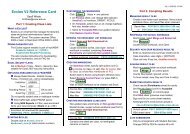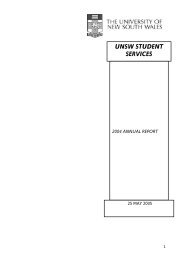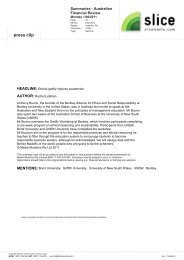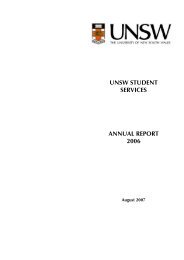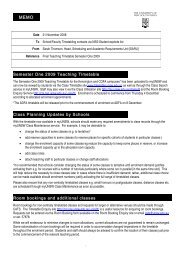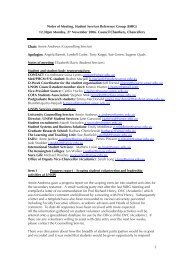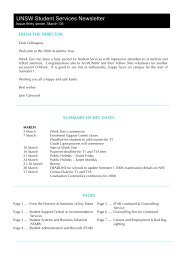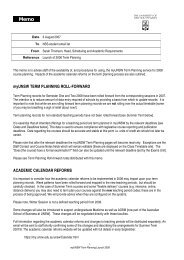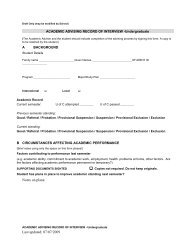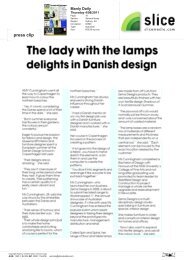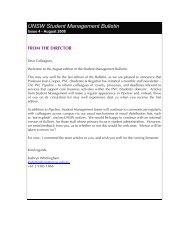University-wide timetabling policy - myUNSW
University-wide timetabling policy - myUNSW
University-wide timetabling policy - myUNSW
You also want an ePaper? Increase the reach of your titles
YUMPU automatically turns print PDFs into web optimized ePapers that Google loves.
UNSW POLICY<br />
UNIVERSITY-WIDE TIMETABLE<br />
v1.0 - May 2006<br />
Responsible Officer:<br />
Contact Officer:<br />
Approving Authority:<br />
Deputy Vice-Chancellor (Academic)<br />
Head, Scheduling and Academic Requirements Unit<br />
Academic Board<br />
Date Approved: 06 /06 /2006<br />
Date Effective: 06 /06/ 2006<br />
History: v1.0 - May 2006<br />
Review Commencement Date:<br />
Related Policies & Documents<br />
Initial review – 1 year from date of approval<br />
Follow-up review – no later than 2 years from initial review.<br />
See Section 11 below<br />
File Number: 2006/0465<br />
1 Purpose<br />
The purpose of the <strong>policy</strong> is to define the objectives, scheduling principles, and organisational<br />
arrangements that will underpin the production of the <strong>University</strong>-<strong>wide</strong> timetable. The primary<br />
objective is to produce a timetable that: is equitable, effective, and complete; takes into account the<br />
needs of both students and staff; and maximises the efficient use of space and resources.<br />
The Policy is supported by the <strong>University</strong>-<strong>wide</strong> Timetable Operational Guidelines (documented<br />
separately), which will be developed iteratively in response to the <strong>University</strong>’s evolving<br />
requirements.<br />
2 Background<br />
The <strong>University</strong> has adopted a <strong>University</strong>-<strong>wide</strong> teaching timetable, introduced for the 2007 academic<br />
year. Historically, <strong>timetabling</strong> of classes has been the responsibility of individual faculties and<br />
schools with little co-ordination of activities and no central administrative support, other than the<br />
booking of rooms for teaching activities by CATS. The <strong>timetabling</strong> process has used a roll-forward,<br />
precedent-based approach which is unsuitable for responding to an evolving academic curriculum,<br />
and managing the complex interactions and decisions required to support key <strong>timetabling</strong><br />
objectives.<br />
A key outcome of the introduction of a <strong>University</strong>-<strong>wide</strong> timetable will be improved management<br />
reporting on <strong>timetabling</strong> and class enrolment patterns, learning and teaching requirements, and<br />
student / staff class profiles. Comprehensive information captured in the <strong>University</strong>’s business<br />
systems can be used to identify changing needs and make informed planning decisions around<br />
classes, scheduling, learning and teaching space, and resources.<br />
<strong>University</strong>-<strong>wide</strong> Timetable Policy v1.0 May 2006 1 7/06/2006
3 Definitions<br />
The Timetabling Glossary which forms an attachment to the Policy contains definitions of the key<br />
concepts used in <strong>timetabling</strong> at the <strong>University</strong>.<br />
4 Scope<br />
The <strong>University</strong>-<strong>wide</strong> timetable will be produced either annually or by semester (according to need)<br />
and will be campus-based. A common timetable can be scheduled where campuses are located in<br />
the same city.<br />
The inclusion of campuses and faculties in the <strong>University</strong>-<strong>wide</strong> timetable process will be agreed<br />
between the Deputy Vice-Chancellor (Academic) and individual campus / faculty managers.<br />
5 Information Technology Assisted Timetabling<br />
The <strong>University</strong>-<strong>wide</strong> timetable will be produced using Syllabus Plus Course Planner software which<br />
has been in use at UNSW as a room booking system since 1999 and is successfully used at a large<br />
number of Australian and overseas Universities. Use of the software will be expanded to take<br />
advantage of its full scheduling capability.<br />
With the implementation of centralised <strong>timetabling</strong>, Syllabus Plus will be tightly integrated with<br />
several of the <strong>University</strong>’s core student and academic administration systems: NewSouth Student,<br />
NewSouth HR, <strong>myUNSW</strong>, and the Online Handbook. These systems will be further developed to<br />
collect and store <strong>timetabling</strong> requirements and parameters and will support holistic management of<br />
course and <strong>timetabling</strong> information. The systems will support campus-<strong>wide</strong> <strong>timetabling</strong> priorities,<br />
while at the same time accommodating valid local requirements.<br />
6 Principles<br />
6.1 General Principles<br />
6.1.1 The primary objectives in implementing a <strong>University</strong>-<strong>wide</strong> timetable are to produce a<br />
timetable that: is equitable, effective, and complete; takes into account the needs of both<br />
students and staff; and maximises the efficient use of space and resources. The <strong>timetabling</strong><br />
process and system will be engineered around meeting these objectives.<br />
6.1.2 The <strong>University</strong> will use a planning timetable model. A planning timetable is produced ahead<br />
of enrolments using requirements and constraint parameters defined by schools as well as<br />
previous year / semester enrolment data to validate assumptions. All known requirements<br />
and constraints on the timetable should be applied prior to its production. This will facilitate<br />
a stable and complete timetable and minimise the need for changes once the timetable is<br />
published.<br />
A planning timetable supports <strong>myUNSW</strong>’s online, real-time self-service enrolment system<br />
which empowers students to construct their own timetable based on their course choices<br />
and class meeting time preferences.<br />
6.2 Students<br />
6.2.1 The needs of students will be given highest priority in the <strong>University</strong>-<strong>wide</strong> timetable,<br />
reflecting the <strong>University</strong>’s strategic goal to enhance the student experience and learning<br />
outcomes.<br />
6.2.2 The timetable will be optimised to facilitate clash-free student enrolment in core courses,<br />
and maximise choice of elective courses, wherever possible.<br />
6.2.3 Consistent with the previous principle, the timetable will address the needs of students in<br />
combined degree programs, including the requirement for them to enrol in core units across<br />
multiple study areas in the one teaching period.<br />
6.2.4 The timetable will schedule classes for all teaching activities (including large and small<br />
group classes). This will ensure that a complete view of student needs can be considered in<br />
the production of the timetable, and that students are able to attain a complete and cohesive<br />
timetable at enrolment.<br />
<strong>University</strong>-<strong>wide</strong> Timetable Policy v1.0 May 2006 2 7/06/2006
6.2.5 Timetabling arrangements for repeat students, or students progressing according to nonstandard<br />
arrangements (e.g. advanced standing; special substitutions; enrolment over a nonstandard<br />
timeframe), cannot be guaranteed. Where non-standard arrangements apply to a<br />
significant cohort, relevant <strong>timetabling</strong> arrangements will be facilitated where possible.<br />
6.2.6 While constraint-based scheduling of core courses defined for an academic program will be<br />
supported, “clash-free” scheduling of optional course combinations cannot be guaranteed,<br />
especially for course-combinations with low enrolments, due to the impact on the quality of<br />
the timetable. The <strong>University</strong>-Wide Timetable Operational Guidelines contain further<br />
information about the treatment of optional course-combinations in the scheduling process.<br />
6.3 Staff<br />
6.3.1 The needs of staff will be accommodated in the <strong>University</strong>-<strong>wide</strong> timetable. Teaching<br />
commitments and other responsibilities (including administration and research<br />
commitments) will be recognised as constraints.<br />
6.3.2 Allocation of teaching duties will remain the responsibility of Heads of School.<br />
6.3.3 The nomination of staff to particular classes, and all known constraints on teaching staff<br />
availability, will need to be defined and applied prior to production of the timetable in order<br />
to minimise changes resulting from staff clashes or unavailability. Changes can prove<br />
difficult to resolve after the timetable has been produced and impede the stability of the<br />
timetable, inconveniencing both students and other staff.<br />
6.3.4 Once the timetable is finalised, it is acceptable for schools to adjust the allocation of staff to<br />
teaching activities as long as this doesn’t result in changes to the timetable.<br />
6.3.5 A minimum set of conditions will be applied to the scheduling of full-time academic staff to<br />
teaching activities in the timetable. These will:<br />
• Limit the number of contiguous teaching hours in a day<br />
• Limit the span of teaching hours in a day (start of first class to end of final<br />
class)<br />
• Limit the number of teaching days in a week (to provide dedicated time for<br />
research)<br />
• Prevent early teaching on the day following late teaching<br />
• Allow for a break in the middle of the day<br />
• Allow for a teaching-free time-slot in common with other school staff to<br />
facilitate school meetings and seminars<br />
These constraints will be respected and complied with wherever possible. It may<br />
occasionally be necessary to break the constraints where there are compelling reasons<br />
affecting the quality of the timetable.<br />
6.4 Teaching Space<br />
6.4.1 The timetable will be optimised to ensure the effective use of teaching spaces and facilities<br />
across the week. Classes will be allocated to appropriately equipped spaces that suit the<br />
mode of teaching and class size.<br />
6.4.2 All teaching facilities, including specialist teaching space, will be incorporated into the<br />
<strong>timetabling</strong> system. This will provide for a total <strong>timetabling</strong> solution and ensure that<br />
students can obtain a complete and coherent timetable at enrolment.<br />
6.4.3 The <strong>timetabling</strong> system will incorporate controls to ensure the allocation of appropriate<br />
classes into school-managed and specialist teaching space.<br />
6.4.4 Location precincts will be defined in the <strong>timetabling</strong> system to support the scheduling of<br />
classes into teaching spaces in buildings and areas on a campus that are within reasonable<br />
proximity to a school’s teaching staff.<br />
6.4.5 The allocation of teaching space in the timetable will be managed by UNSW Student<br />
Services. Student Services will also manage requests for scheduling additional classes once<br />
the timetable is finalised and published.<br />
6.4.6 CATS will manage all casual bookings, including requests for space to accommodate small<br />
classes which fall outside the scope of the <strong>University</strong>-<strong>wide</strong> timetable. CATS will also be<br />
responsible for the maintenance and operation of centrally allocated teaching space.<br />
<strong>University</strong>-<strong>wide</strong> Timetable Policy v1.0 May 2006 3 7/06/2006
6.5 Teaching Hours and Times<br />
6.5.1 Classes to be attended by full-time students will be scheduled between the hours of 9 am<br />
and 6 pm Monday to Thursday, and between 9 am and 4 pm on Fridays.<br />
6.5.2 At the request of a School, classes may also be scheduled between 8 am and 9.30pm<br />
Monday to Friday in order, for example, to support attendance by part-time students, or<br />
make use of special teaching facilities, or utilise the services of external specialist teaching<br />
staff.<br />
6.5.3 Classes may also be scheduled outside of these days/hours with the approval of the relevant<br />
Head of School, for example, on weekends. Such arrangements must comply with the<br />
requirements of the UNSW (Academic Staff) Enterprise Agreement.<br />
6.6 Special Scheduling Requests<br />
6.6.1 A School may request same-time and/or co-location of activities for individual or related<br />
courses. The need for this may arise where students need to transfer between courses that<br />
are offered at different levels, or where a course is offered through multiple aliases.<br />
6.6.2 The order in which activities for a course are scheduled within a teaching week will not be<br />
sequenced. A School may apply to the Deputy Vice-Chancellor (Academic) for special<br />
permission to sequence classes where it believes compelling pedagogical grounds exist. It is<br />
generally expected that small group classes will be based on the previous week’s lecture<br />
materials and consequently activity sequencing will not be necessary for the large majority<br />
of courses.<br />
6.6.3 Some courses with anticipated enrolments of ten or fewer students (e.g. honours seminars)<br />
may be timetabled by the school responsible in consultation with students enrolled in the<br />
course, rather than being centrally timetabled. Venues for these classes will be organised<br />
either as casual room bookings (to be made after the teaching timetable is finalised) or by<br />
using School facilities.<br />
6.7 Scheduling Calendar<br />
6.7.1 The schedule of dates for producing the timetable will be established on an annual or<br />
semester basis by UNSW Student Services. The schedule will align with related NewSouth<br />
Student and handbooks review and publication cycles, and will comply with dates<br />
established by the Commonwealth in the Higher Education Support Act (2003) for finalising<br />
schedules of courses to be offered in a calendar period.<br />
6.7.2 The <strong>University</strong>-<strong>wide</strong> Timetable Operational Guidelines will be reviewed annually by<br />
UNSW Student Services in consultation with the Timetabling Reference Group. The<br />
Guidelines will be distributed, with Procedures and the Scheduling Calendar, to School<br />
<strong>timetabling</strong> staff.<br />
6.7.2 The final timetable will be released to students several weeks in advance of the<br />
commencement of enrolment for a teaching period. A draft timetable will be prepared and<br />
released to schools for review in advance of this. Additionally, prototype timetables will be<br />
developed iteratively and results circulated for review and feedback by faculty staff prior to<br />
production of the final timetable.<br />
6.7.3 Unbooked teaching spaces will be released for casual bookings three weeks after the<br />
commencement of classes in a semester.<br />
6.8 Changes to the Final Timetable<br />
6.8.1 Changes to the final timetable will only be considered in exceptional circumstances. Valid<br />
reasons for changes include:<br />
- need to schedule additional classes for courses where demand exceeds<br />
expectations<br />
- unexpected staff turnover<br />
- a location becomes a health or safety hazard<br />
- reasonable adjustments to accommodate students with special needs<br />
<strong>University</strong>-<strong>wide</strong> Timetable Policy v1.0 May 2006 4 7/06/2006
7 Equity<br />
Consistent with <strong>University</strong> <strong>policy</strong> and relevant legislation, <strong>timetabling</strong> procedures will make<br />
reasonable accommodations for staff and students in regards to family responsibilities, religious<br />
beliefs, and disabilities.<br />
8 Governance<br />
The governance arrangements are set out in the <strong>University</strong>-<strong>wide</strong> Timetable - Governance Structure<br />
document. Governance will be provided by a Timetable Steering Committee (with a particular focus<br />
on quality assurance and resourcing of operations, licences and future developments), a Timetabling<br />
Reference Group (with a particular focus on agreeing operational guidelines, <strong>timetabling</strong> priorities<br />
and resolution of issues). Both groups will have cross-divisional and cross-functional representation<br />
from throughout the <strong>University</strong> to ensure broad and appropriate consideration of relevant issues. The<br />
Steering Committee will report to and advise executive management and the Academic Board (via<br />
the Academic Services Committee).<br />
9 Review<br />
<strong>University</strong> <strong>timetabling</strong> <strong>policy</strong> and procedures will require regular review. The <strong>University</strong>-<strong>wide</strong><br />
<strong>timetabling</strong> strategy, governance arrangements, and <strong>policy</strong> are to be reviewed at least bi-annually.<br />
Operational guidelines are to be reviewed at the end of each business cycle. Reviews will be coordinated<br />
by UNSW Student Services.<br />
10 Acknowledgements<br />
This Policy draws on information from <strong>timetabling</strong> <strong>policy</strong> documents developed at other Australian<br />
universities, including:<br />
- ANU<br />
- <strong>University</strong> of Adelaide<br />
11 Reference Documents<br />
<strong>University</strong>-<strong>wide</strong> <strong>timetabling</strong> – Operational Guidelines.<br />
<strong>University</strong>-<strong>wide</strong> <strong>timetabling</strong> – Governance Structure.<br />
<strong>University</strong>-<strong>wide</strong> <strong>timetabling</strong> – Glossary.<br />
CATS Procedures Manual<br />
http://www.cats.unsw.edu.au/downloads/cats_usermanual_2004.pdf<br />
Space Management Policy and Procedures<br />
http://www.infonet.unsw.edu.au/poldoc/space.htm<br />
Enterprise Bargaining Agreement – academic staff<br />
Higher Education Support Act (2003), Commonwealth of Australia<br />
>>End document<br />
<strong>University</strong>-<strong>wide</strong> Timetable Policy v1.0 May 2006 5 7/06/2006



